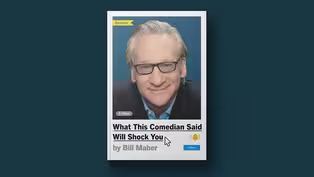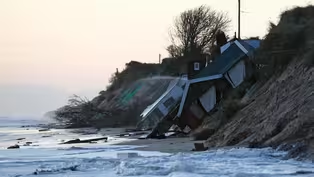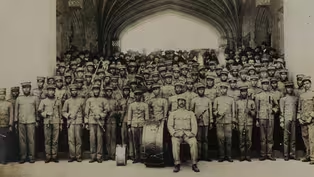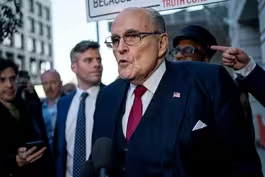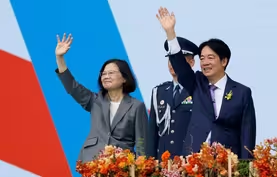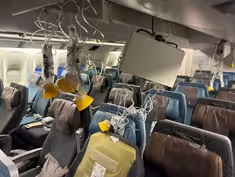
How Trump's alleged hush money payments led to his charges
Clip: 5/21/2024 | 7m 58sVideo has Closed Captions
How Trump's alleged hush money payments led to his charges in New York
Donald Trump’s defense team rested its case Tuesday in the trial brought against the former president by the Manhattan District Attorney’s Office. Next week, both sides will make their closing statements to the jury and then deliberations will begin. While this case is often called a hush money trial, the charges against the former president are more complicated. William Brangham explains.
Problems playing video? | Closed Captioning Feedback
Problems playing video? | Closed Captioning Feedback
Major corporate funding for the PBS News Hour is provided by BDO, BNSF, Consumer Cellular, American Cruise Lines, and Raymond James. Funding for the PBS NewsHour Weekend is provided by...

How Trump's alleged hush money payments led to his charges
Clip: 5/21/2024 | 7m 58sVideo has Closed Captions
Donald Trump’s defense team rested its case Tuesday in the trial brought against the former president by the Manhattan District Attorney’s Office. Next week, both sides will make their closing statements to the jury and then deliberations will begin. While this case is often called a hush money trial, the charges against the former president are more complicated. William Brangham explains.
Problems playing video? | Closed Captioning Feedback
How to Watch PBS News Hour
PBS News Hour is available to stream on pbs.org and the free PBS App, available on iPhone, Apple TV, Android TV, Android smartphones, Amazon Fire TV, Amazon Fire Tablet, Roku, Samsung Smart TV, and Vizio.
Providing Support for PBS.org
Learn Moreabout PBS online sponsorshipGEOFF BENNETT: From Arizona now to New York, where Donald Trump's defense team rested its case today and the trial brought against the former president by the Manhattan district attorney's office.
Donald Trump did not testify.
Next week, lawyers from both sides will make their closing statements to the jury and then deliberations will begin.
As William Brangham explains, while this case is often referred to as the hush money trial, the charges against the former president are far more complicated -- William.
WILLIAM BRANGHAM: Donald Trump is not being charged with making that 2016 hush money payment to silence adult film star Stormy Daniels.
His former lawyer Michael Cohen paid that $130,000 and did so, Cohen testified, to protect Trump's chances of winning the presidency.
Trump is charged with how he repaid Michael Cohen.
Prosecutors allege Trump was responsible for falsifying 34 different business records to hide the true nature of that repayment, calling them legal fees instead, and that Trump did so intending to commit or conceal another crime, a violation of state election law.
So, to help us wade through these legal weeds, we are joined again by Jessica Roth.
She's a former federal prosecutor, but now teaches at Cardozo School of Law.
Jessica, it's so nice to see you again.
Thank you for being here.
I want to talk through the different things that the prosecutors have to prove in this case.
So, during trial, as I mentioned, the prosecutors showed 34 allegedly false invoices, ledgers, checks, and check stubs all relating to payments made to Michael Cohen.
While they were labeled legal fees, prosecutors say these were really a way to masquerade the true repayment to Michael Cohen.
First off, what do prosecutors have to prove as far as Donald Trump's involvement in how those records were created?
JESSICA ROTH, Yeshiva University Cardozo School of Law: So these records are the heart of the charges.
As you mentioned, it's 34 counts of falsification of business records with the intent to conceal another crime.
And so to convict Donald Trump of each of those charges, the prosecutors have to prove beyond a reasonable doubt that Trump was involved in the scheme to falsify these records.
They don't have to show that he personally created or maintained or falsified the particulars in these records.
His signature does appear on some of the checks, but his signature doesn't appear on all of them, and it doesn't have to be there.
What they have to show is that he caused others to maintain these false records or assisted others in maintaining them or requested others to maintain or create and maintain false records, so that he's part of the scheme, even if it wasn't that they were falsified by his own hand, and, further, that he participated in this scheme, causing others or requesting others to falsify the records or maintain false records with the intent to conceal another crime.
WILLIAM BRANGHAM: So, for instance, when Michael Cohen testified that he and the Trump Organization's top financial officer, Allen Weisselberg, went into a meeting with Donald Trump and said, here's the scheme, here's how we're going to make these repayments to Michael Cohen, it'll be to pay the Stormy Daniels thing back, that might be enough to meet this standard that he then helped set in motion the falsification?
JESSICA ROTH: Yes, because the prosecution's theory is that Michael Cohen and Allen Weisselberg went in to inform Trump of the plan to get his sign-off on the plan to conceal the payment to Michael Cohen through the disguise that they were for legal fees, as opposed to reimbursement for the payment to Stormy Daniels.
And because Donald Trump signed off on the creation of these records to hide the payment, he caused the records, the false records, to be created and maintained in the files of the Trump Organization.
That's the prosecution's theory of the case.
WILLIAM BRANGHAM: Now, the defense's theory of this case is that these were legal fees, as I said, and that they were plain and simple, nothing to justify here.
They also argue you can't believe anything Michael Cohen says because he's an inveterate liar, but that is separate.
If they were to address this particular issue of Trump's complicity or not in the falsification, what's their best line of attack there?
JESSICA ROTH: Their best line of attack is to say that there isn't sufficient evidence to prove beyond a reasonable doubt that Trump, in fact, was involved in the scheme to falsify the records.
There's ample evidence that Michael Cohen and Allen Weisselberg concocted this scheme and participated in it.
You hear that not only from Michael Cohen, but that's corroborated by the records in Allen Weisselberg's handwriting, essentially showing how the numbers were worked out, so Michael Cohen would be reimbursed for precisely this amount.
But Allen Weisselberg hasn't testified.
And so, in effect, there are really only three people, according to the prosecution's theory of the case, who have direct knowledge of Trump's participation in the falsification of the records scheme.
And Michael Cohen is the only one of those three who have testified.
Now, his testimony is corroborated circumstantially by other evidence, for example, by phone records that show that Cohen was in communication with Trump around the same time that he said he was or on the dates he said he was about this scheme.
There was testimony from Trump's White House assistant, who said Cohen came to the White House, had discussions with Trump around the same time that Cohen says they were talking about this scheme.
And then there was testimony from employees at the Trump Organization, who said that Trump was very involved in the nitty-gritty of payments and records at the Trump Organization, which would suggest that, generally, it was his pattern to be kept apprised of payments and what they were for.
And so, all of that tends to corroborate what Michael Cohen is saying substantively about this matter, even though there's no other witness with direct knowledge of it.
WILLIAM BRANGHAM: So these falsification charges, they're normally misdemeanors, but the Manhattan DA charged these as felonies.
And they're arguing that, if you commit these falsifications in service of or they're trying to conceal another crime, then they have become a felony.
What do prosecutors have to prove in that regard?
JESSICA ROTH: So this is a really interesting part of the case.
And I think there was a lot of discussion today at the conference about the jury instructions about exactly what the judge is going to tell the jury about this.
But, in essence, the prosecutors are now arguing, primarily, that that other crime was a New York state law that makes it a crime to promote a candidate's election through unlawful means.
But that, of course, incorporates by reference other provisions of law, because the government has to establish what are those other unlawful means, that there was a conspiracy to use to promote the candidate's election.
And so the government has to specify, well, what are the laws that they contend were violated and that were concealed, essentially, through the falsification scheme?
And they appear to be leaning primarily on violations of federal election law that place limits on the amount that an individual can contribute to a candidate.
And the theory here is that Cohen, by fronting the money to Stormy Daniels, made an unlawful campaign contribution to Trump that also was not disclosed.
Now, one of the questions that remains to be resolved is whether it has to be a criminal violation of the federal election law to essentially count for purposes of the New York state statute, or whether a civil violation of the federal election law, which is less demanding, also would count.
WILLIAM BRANGHAM: Jessica Roth, so grateful to you that you -- we have you to help us wade through all of this.
Thank you so much.
Always good to see you.
JESSICA ROTH: Good to see you.
Bill Maher on book reflecting on his comedy and commentary
Video has Closed Captions
Clip: 5/21/2024 | 8m 58s | Bill Maher on his new book reflecting on decades of comedy and commentary (8m 58s)
'Climate refugees' sue Britain for failing to protect homes
Video has Closed Captions
Clip: 5/21/2024 | 7m 53s | 'Climate refugees' sue British government for failing to protect homes from climate change (7m 53s)
Exhibit explores humans put on display at 1904 World’s Fair
Video has Closed Captions
Clip: 5/21/2024 | 4m 55s | Exhibit explores experiences of humans put on display at 1904 World’s Fair in St. Louis (4m 55s)
Giuliani, Trump allies arraigned in Ariz. electors scheme
Video has Closed Captions
Clip: 5/21/2024 | 4m 31s | Giuliani, Trump allies arraigned in Arizona fake electors scheme (4m 31s)
Taiwan's new president urges China to end threats
Video has Closed Captions
Clip: 5/21/2024 | 5m 37s | Taiwan's president urges China to end threats as Beijing says independence is 'dead end' (5m 37s)
Turbulence on Singapore Airlines flight kills passenger
Video has Closed Captions
Clip: 5/21/2024 | 5m 26s | Severe turbulence on Singapore Airlines flight kills passenger, injures dozens more (5m 26s)
Providing Support for PBS.org
Learn Moreabout PBS online sponsorshipSupport for PBS provided by:
Major corporate funding for the PBS News Hour is provided by BDO, BNSF, Consumer Cellular, American Cruise Lines, and Raymond James. Funding for the PBS NewsHour Weekend is provided by...
